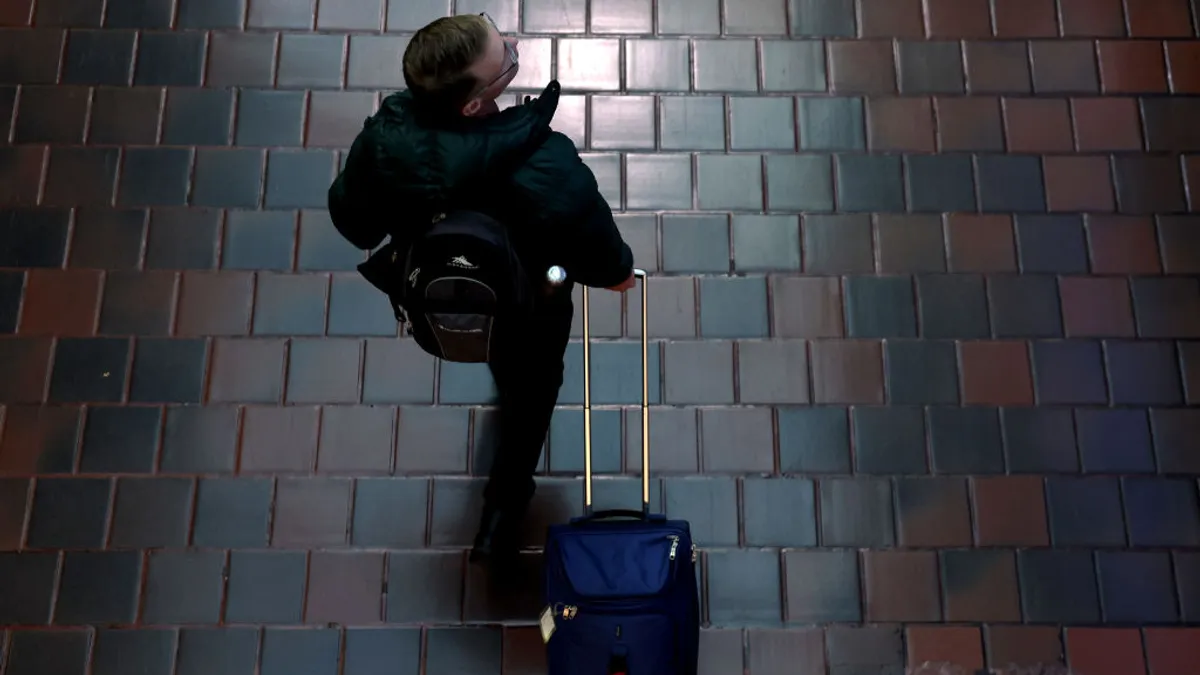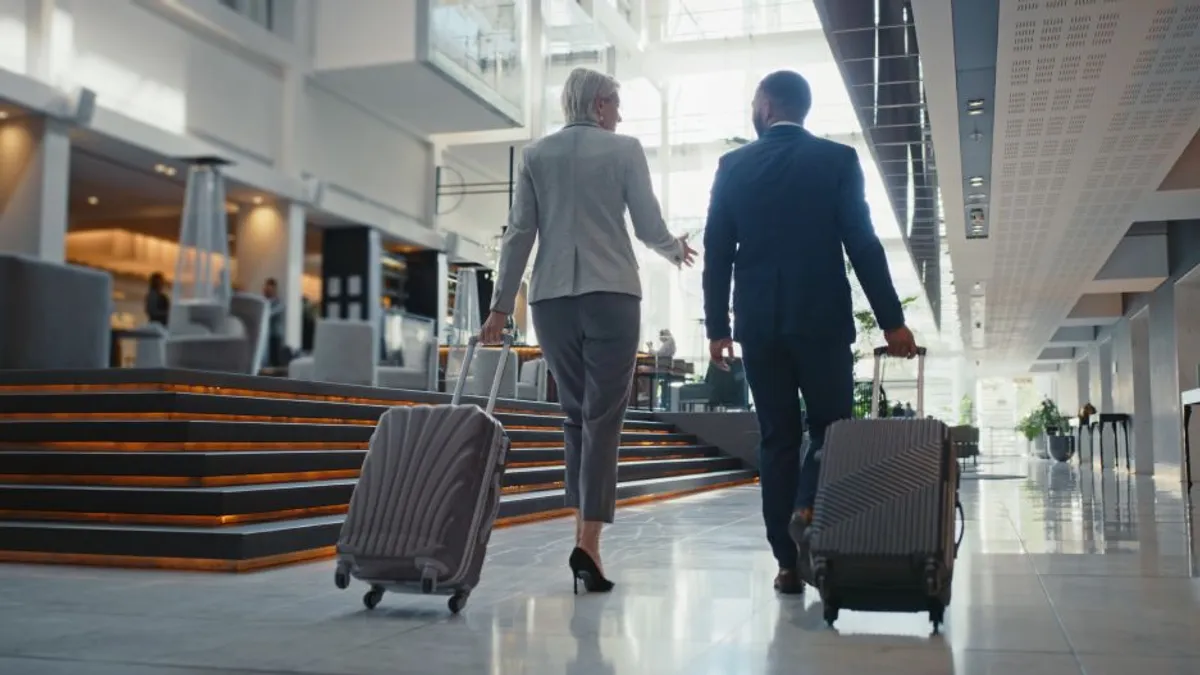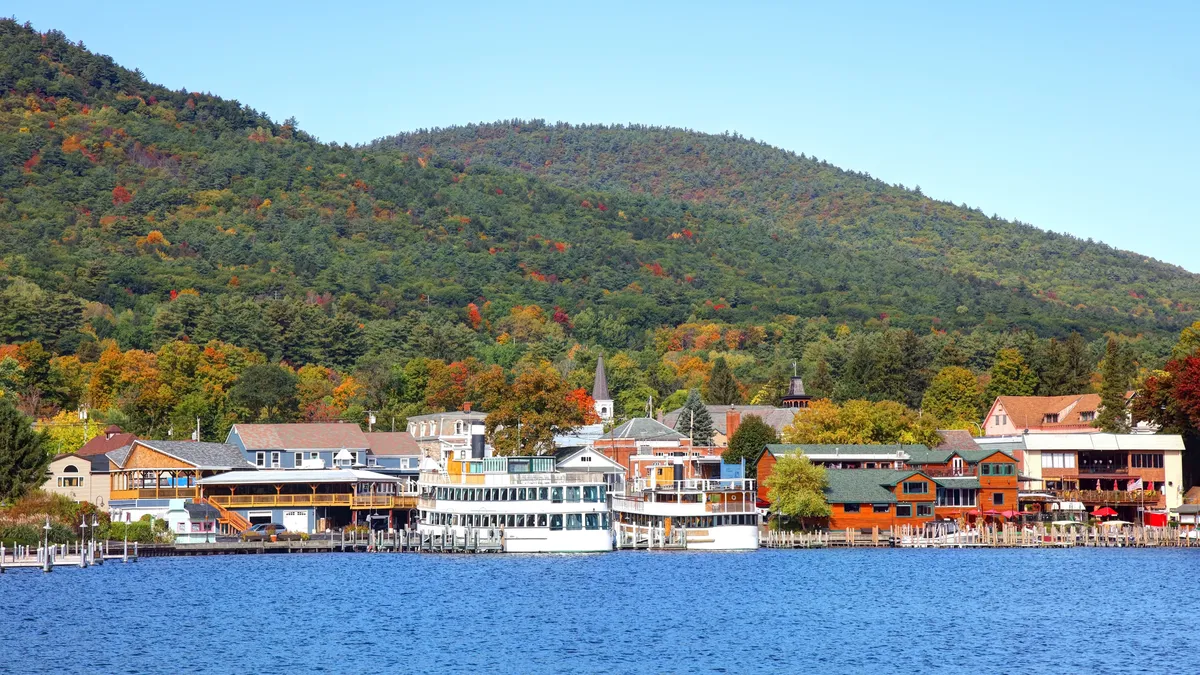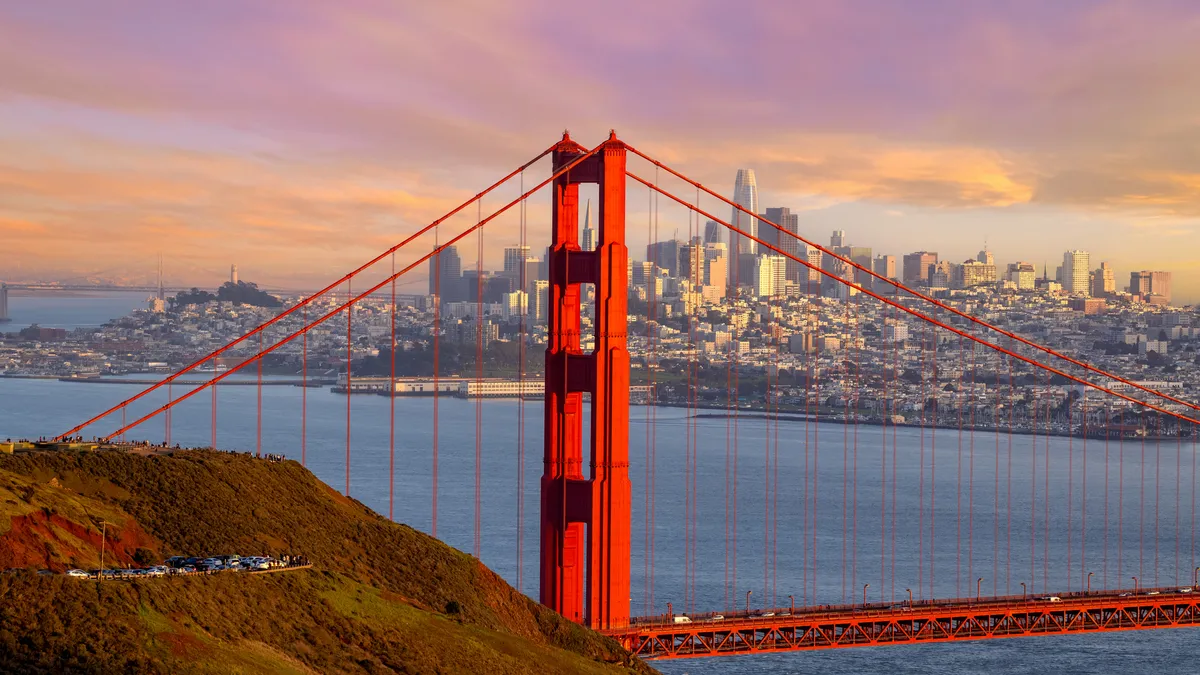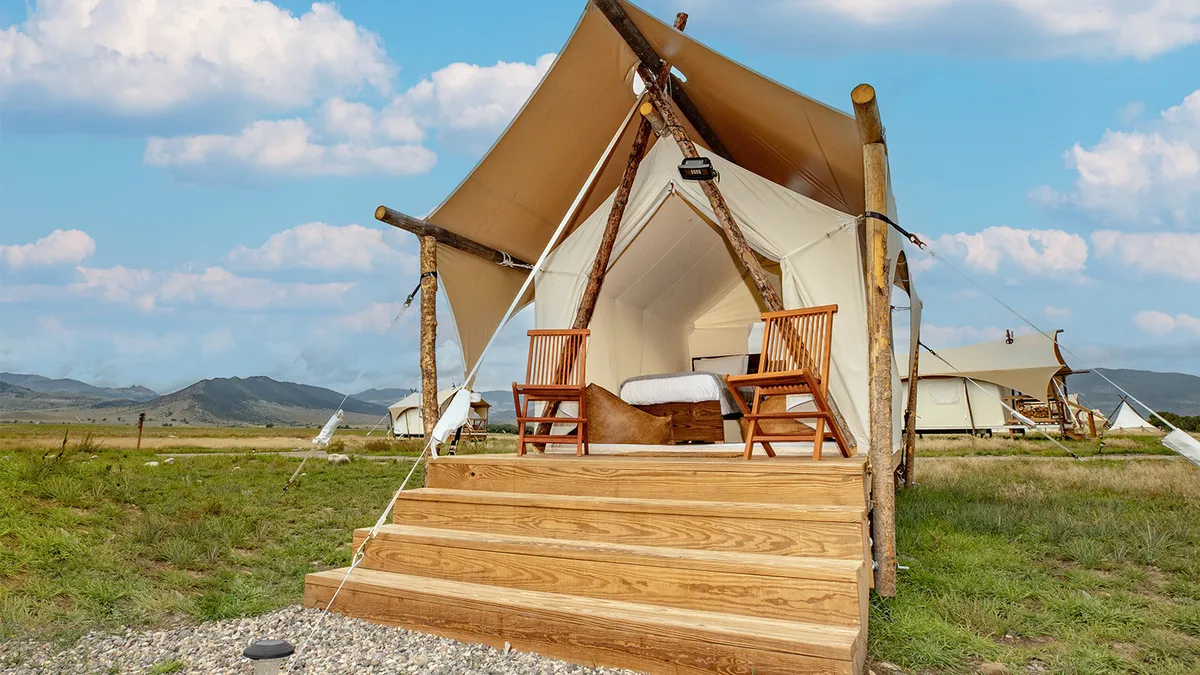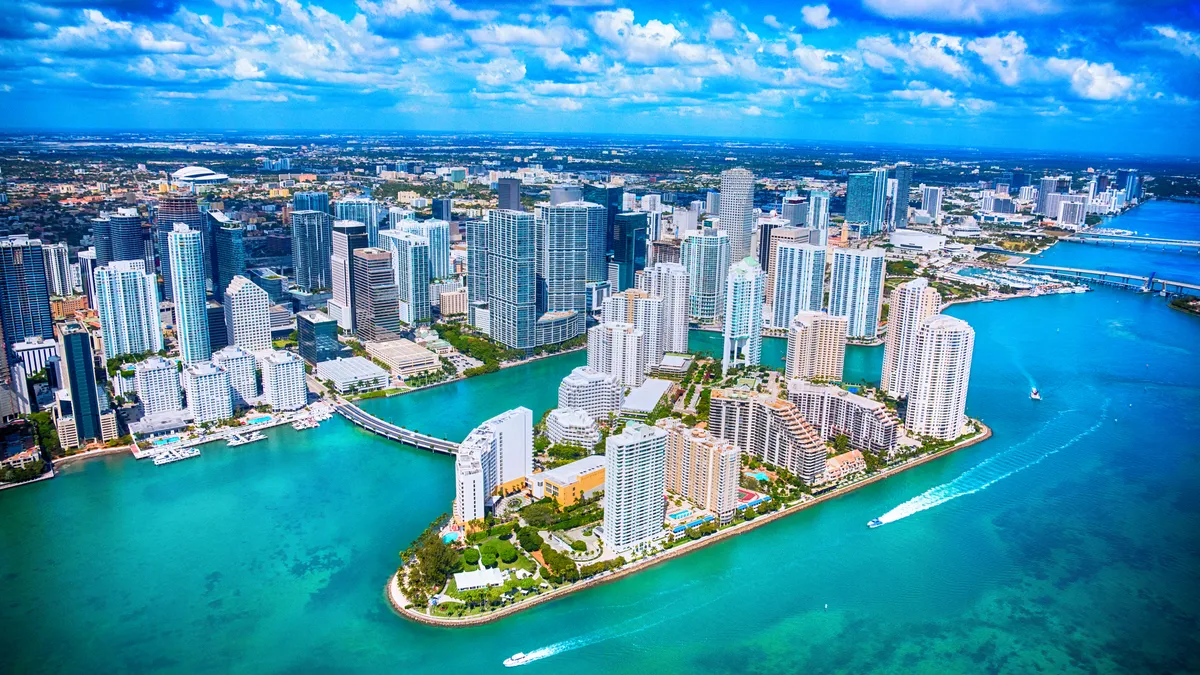This year, 80 million Americans are expected to travel for Thanksgiving alone, according to AAA. The busy holiday week is just the beginning, kicking off what is slated to be a bustling 2024 holiday season, travel experts told Hotel Dive.
“We are seeing that [for] holiday travel overall, the intent is strong this year,” said Kate Ferrara, vice chair and U.S. transportation, hospitality and services sector leader at Deloitte. “That's really good news overall for the hospitality sector.”
Some 52% of Americans plan to travel overnight for leisure in the next four months, according to a Morning Consult survey commissioned by the American Hotel & Lodging Association. And 66% percent of Americans say they are more likely or equally as likely to stay in a hotel this fall or winter compared to a year ago, the survey found.
Travelers are also taking more — and longer — trips this year, Ferrara said. Their seasonal budgets are higher, too, with travelers expecting to spend $3,294 on average for their longest holiday trip, according to Deloitte’s 2024 Holiday Travel Survey.
This year, however, presents new opportunities and challenges for hoteliers as traveler demographics and preferences shift, hotel guests prioritize technology and inflation takes a toll on budgets.
Shifting demographics
Younger generations and high-income travelers are leading the charge this year when it comes to holiday travel, according to Deloitte.
“Particularly in the younger generations, people seem to be prioritizing travel and experience over gifts and durable goods,” Ferrara said, noting the emphasis on experiences is “helping to drive the sector overall.”
In fact, baby boomers are the only generation not planning on higher trip frequency and spending, Deloitte found. Millennials, meanwhile, plan to spend the most on travel this season — $3,927 on average — and take the most trips.
A greater share of higher-income Americans, which Deloitte defines as people making $100,000 and above, are also planning to travel this year: 66% to be exact, up from 59% in 2023. This income bracket will also account for 52% of those staying in paid lodging this holiday season, Deloitte found.
Particularly in the younger generations, people seem to be prioritizing travel and experience over gifts and durable goods.

Kate Ferrara
vice chair and U.S. transportation, hospitality and services sector leader at Deloitte
“The other piece that we're seeing with that, which can be really great, are things like upgrades, and some of what we're seeing around the luxury market,” Ferrara noted, adding the rise in higher-income travelers “is good news for a lot of hotels,” given these travelers generally spend more while on their trips.
On the flip side, inflation is still hurting some travelers’ wallets. Some 39% of Americans say they can’t afford to travel this winter, and 31% say travel is too expensive currently — similar numbers to last year’s holiday travel season data, when inflation was also a factor.
The growth in travel prices slowed this year amid cooling inflation, the U.S. Travel Association reported in September.
Keeping up with work
This holiday season, there are a couple of travel trends that will impact how consumers spend their time while on vacation and what they prioritize at hotels.
In its 2024 holiday travel survey, Deloitte found that remote work, which skyrocketed nearly five years ago due to the COVID-19 pandemic, is still very much impacting travel behavior. And this holiday season, travelers are lugging their laptops along to keep up with work while away.
During the holidays this year, 49% of employed travelers intend to work at least partially while on their longest leisure trip of the season, up from 34% during the same period last year, according to Deloitte.
These “laptop luggers,” as Deloitte calls them, are adding trip time as well. According to the report, these consumers are adding eight days on average to their seasonal travel due to their ability to work remotely. This could provide a significant opportunity for hotels, with travelers booking additional room nights during their extended trips.
The trend of blending work with leisure travel will continue into next year, particularly as travelers head on more trips with “frolleagues,” or work colleagues who double as friends, as Hilton called them in its annual trends report for 2025.
Embracing technology
Another trend shaping travel this holiday season is more travelers prioritizing technology to enhance their stays, according to PwC’s Holiday Travel 2024 report.
Regardless of their destination or desired experience, travelers increasingly expect hospitality providers to use technologies that increase efficiency and convenience, PwC detailed. For hotels, this could be a mobile key to access hotel guest rooms or online booking tools.
Technology preferences vary by generation. Gen Z and millennial travelers said that having mobile options for hotel access this holiday season is important, emphasizing seamless interactions like personalized entertainment and contactless services, according to PwC.
Gen X travelers, meanwhile, find mobile check-in important but remain cautious about more advanced features like biometric security, the report detailed. Baby boomers placed less importance on contactless technologies.
According to the PwC report, 81% of Gen Z respondents noted that mobile hotel keys are important, whereas only 49% of baby boomers did the same. Additionally, 73% of Gen Z and 79% of millennial respondents said contactless hotel check-in was important to them this holiday season, while 38% of baby boomers said the same.
With more Gen Z travelers taking trips over the holiday season this year — and expecting hospitality providers to embrace digital technologies to make those trips more enjoyable — hotels will need to innovate with technology to gain and keep the loyalty of these consumers, according to PwC.




